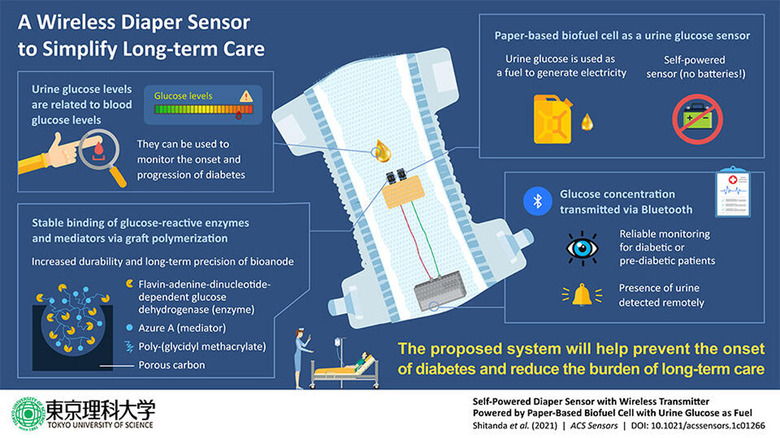New Sensor Creates Electricity From Urine And Measures Glucose Levels
Scientists from Tokyo University of science have created a new sensor designed to be fitted into diapers that generates the electricity it needs to operate directly from urine using a biofuel cell. While the device can generate the power it needs to operate using urine, it also measures glucose concentrations, helping caregivers monitor wearers for diabetes. Scientists say that glucose levels in urine are directly related to blood glucose levels.
Typically, monitoring blood glucose levels involves needles and drawing drops of blood to test directly using expensive test strips and glucometers. The sensor is completely self-powered and needs no battery to get the electricity to operate because it uses urine as fuel. The advent of a self-power biosensor that can be placed into a diaper is seen as a significant advance for medical care because they are usable by both skilled medical staff and people without medical training to remotely monitor diabetes, which is a common disease.
For diabetic care, monitoring blood sugar is extremely important, and a sensor of this type avoids blood draw, which is why some people with diabetes don't monitor their condition appropriately. Scientists say the sensor could be used to monitor both diabetics or those with pre-diabetic conditions. While diapers are most commonly associated with babies, some adult diabetics cannot get out of bed due to injury or age and wear diapers.
The sensor uses electrochemistry to generate electricity from urine. Researchers developed a paper-based biofuel cell that leverages a reduction-oxidation reaction to reduce electrical power based on glucose in the patient's urine. A special anode was created using graft polymerization using carbon to embed glucose-reactive enzymes and mediator molecules. That serves as the base conductive material for the wearable sensor.

The electricity generated by the biosensor powers a Bluetooth Low Energy transmitter sending the measured concentration of glucose wirelessly to a smartphone. Researchers note it is very fast able to gather data for a reading in about a second. There's no indication at this time when the sensor might be available for commercial use.
